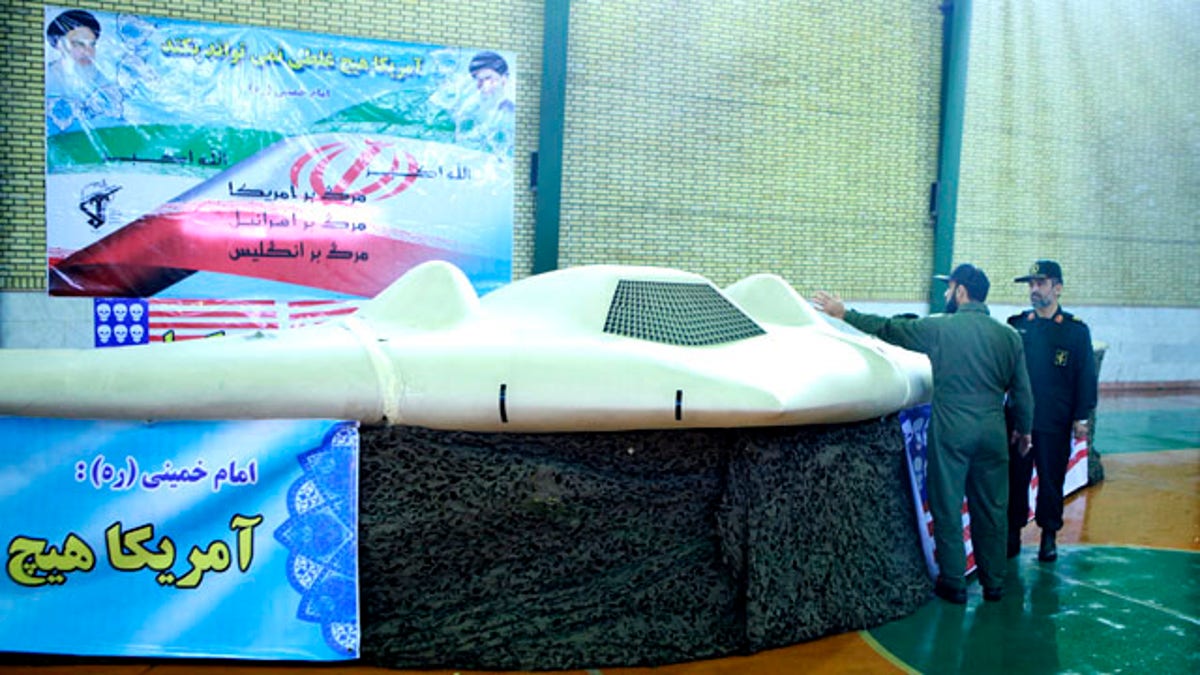
Dec. 8, 2011: A photo by the Iranian Revolutionary Guards purportedly shows a U.S. RQ-170 Sentinel drone that Tehran says its forces downed earlier in the week, as the chief of the aerospace division of Iran's Revolutionary Guards, Gen. Amir Ali Hajizadeh, right, listens to an unidentified colonel. (AP Photo/Sepahnews)
A senior U.S. official scoffed at claims that Iran "hijacked" the RQ-170 spy drone through a sophisticated attack on a navigational weakness in the secret surveillance craft.
Using knowledge purportedly gleaned from "previously downed and captured drones," Iran was able to reprogram the GPS system in the U.S.-made RQ-170 Sentinel -- an advanced spy drone that was flying over Iranian territory before falling into the country's hands earlier this month, an unnamed Iranian engineer told the Christian Science Monitor.
But American officials insist that neither weaponry nor technology brought down the spy drone.
"This claim is ludicrous," a senior U.S. official told FoxNews.com, flat-out denying the report.
The Sentinel is so advanced that the U.S. Air Force has not even distributed a photo of it. The $6 million unmanned craft is manufactured by Lockheed Martin and is equipped with advanced stealth technology; it has an RQ in its name to indicate it is unarmed.
According to the Christian Science Monitor, the “spoofing” technique that Iran used -- which took into account precise landing altitudes, as well as latitudinal and longitudinal data -- made the drone “land on its own where we wanted it to, without having to crack the remote-control signals and communications” from the U.S. control center, the engineer said.
GPS spoofing is only the latest explanation for how the top-secret spy plane -- called the "Beast of Kandahar" in the media -- fell into Iranian hands.
A Russian news report recently stated that Iran had purchased a “consignment” of mobile radar detectors. Other websites describe the truck mounted equipment as an electronic countermeasure system intended to jam airborne radar systems.
Reports suggest that these 1L222 Avtobaza detectors were used to jam communications with the drone.
Stephen Trimble, a military analyst for aviation website Flight Global, called the Avtobaza "the perfect tool to target and perhaps infiltrate the communications link that allows a UAV to be controlled from a remote location."
"Since we know the Iranians now have the Avtobaza, it seems that the system is at least the basis of Iran's claims that the RQ-170 was captured by way of electronic subterfuge," Trimble told FoxNews.com. A former U.S. ambassador said earlier in the month that if such reports are true, the situation becomes all that much worse.
"Some reports have said Russia sold (Iran) a very sophisticated jamming system a short time ago," U.S. Ambassador to the United Nations John Bolton told Fox News. "Now, our military says that is not true, it came down because of a malfunction. I certainly hope that's right because if the Russians have provided Iran with sophisticated jamming equipment it means a lot else is at risk too."
Of course, given the secretive nature of the mission and the RQ-170 drone itself, the truth may never emerge -- and may even be something purely mundane.
"It's entirely possible the aircraft ran out of gas and malfunctioned independent of any Iranian electronic interference," Trimble told FoxNews.com.








































